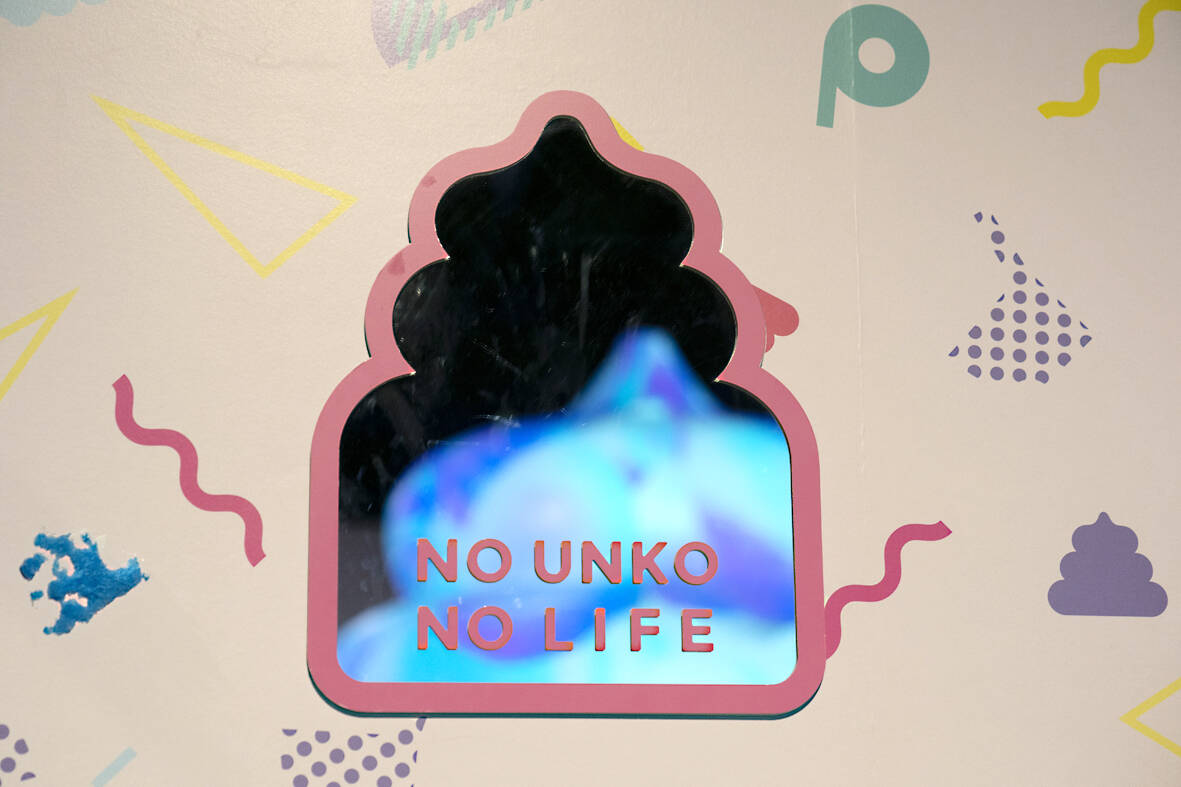When nature calls, Masana Izawa has followed the same routine for more than 50 years: heading out to the woods in Japan, dropping his pants and doing as bears do.
“We survive by eating other living things. But you can give faeces back to nature so that organisms in the soil can decompose them,” the 74-year-old said.
“This means you are giving life back. What could be a more sublime act?”

Photo: AP
“Fundo-shi” (“poop-soil master”) Izawa is something of a celebrity in Japan, publishing books, delivering lectures and appearing in a documentary.
People flock to his “Poopland” and centuries-old wooden “Fundo-an” (“poop-soil house”) in Sakuragawa, north of Tokyo, sometimes dozens of them a month.
There, in his 7,000-square-metre woodland — about the size of a soccer pitch — visitors get tips for open-air best practice.

Photo: Reuters
“Noguso,” as it is known in Japanese, requires digging a hole, a leaf or two for wiping, a bottle of water to wash up and twigs to mark the spot.
The sticks ensure he doesn’t use the same place twice and can later return to keep precise records of the decomposition process.
“Feel the back of these. Can you tell how soft they are?” he said, showing palm-sized silver poplar leaves picked from a branch.

Photo: AP
“[It’s] more comfortable than paper.”
EGOCENTRIC
Izawa is a former nature photographer who specialised in mushrooms before retiring in 2006.
His excrement epiphany came at age 20 when he saw a protest against the construction of a sewage plant.
“We all produce faeces, but [the demonstrators] wanted the treatment plant somewhere far away and out of sight,” he says.
“People who believed they were absolutely right made such an egocentric argument.”
He concluded that to alleviate his own conscience at least, outdoor defecating was the answer.
FALLING FOUL
Toilets, toilet paper and wastewater facilities require huge amounts of water, energy and chemicals. Letting soil do the work is much better for the environment, says Izawa, who believes more people should follow his lead.
Human waste — more than other animals’ — can contain bacteria that are potentially harmful to the environment, and defecating outside is banned in Japan.
But since Izawa owns the forest around his centuries-old house, he has not fallen foul of the authorities.
He digs up old spots that he says show human stools are entirely and quickly broken down, unless they contain antibiotic medicines.
“Fungal activities degrade and transform things like dead animals, excrement and fallen leaves into nutritious earth, on which a forest grows,” he says.
RISKY BUSINESS
Izawa’s iron beliefs have cost him dearly, not least his second marriage after an incident involving Machu Picchu, the popular tourist site in Peru.
He cancelled a leg of their honeymoon trip to the site after learning he would have to use the facilities.
“I jeopardised my wife and a trip to Machu Picchu just for a single ‘noguso’,” he says, laughing.
He believes that climate change and the growing interest in more sustainable ways of living may be winning him more attention, especially from young people.
Kazumichi Fujii, 43, a soil scientist at the Forestry and Forest Products Research Institute (FFPRI) in Japan, agreed.
“[It is] due to the Fukushima [nuclear] disaster, the Greta Thunberg movement, ... distrust for the preceding generations and the desire for alternatives,” Fujii said.
But Fujii warns Izawa that his methods may not be as safe as he thinks, particularly his habit of tasting the soil from Poopland to demonstrate how safe it is.
The city of Edo, as pre-modern Tokyo was known, used human excrement to fertilise farmland, but “some 70 percent of residents suffered from parasite infection,” Fujii said.
“I must be seen as a hell of a freak,” laughs Izawa. “But it is due to the human-centric society.
“In the whole ecological system, no other animal but humans use toilets...the human world is rather absurd to me.”
He now strongly hopes that his body will also be decomposed in the forest instead of being cremated as is customary in Japan.
“I find the purpose of living in doing ‘noguso’,” he said.

Towering high above Taiwan’s capital city at 508 meters, Taipei 101 dominates the skyline. The earthquake-proof skyscraper of steel and glass has captured the imagination of professional rock climber Alex Honnold for more than a decade. Tomorrow morning, he will climb it in his signature free solo style — without ropes or protective equipment. And Netflix will broadcast it — live. The event’s announcement has drawn both excitement and trepidation, as well as some concerns over the ethical implications of attempting such a high-risk endeavor on live broadcast. Many have questioned Honnold’s desire to continues his free-solo climbs now that he’s a

As Taiwan’s second most populous city, Taichung looms large in the electoral map. Taiwanese political commentators describe it — along with neighboring Changhua County — as Taiwan’s “swing states” (搖擺州), which is a curious direct borrowing from American election terminology. In the early post-Martial Law era, Taichung was referred to as a “desert of democracy” because while the Democratic Progressive Party (DPP) was winning elections in the north and south, Taichung remained staunchly loyal to the Chinese Nationalist Party (KMT). That changed over time, but in both Changhua and Taichung, the DPP still suffers from a “one-term curse,” with the

Lines between cop and criminal get murky in Joe Carnahan’s The Rip, a crime thriller set across one foggy Miami night, starring Matt Damon and Ben Affleck. Damon and Affleck, of course, are so closely associated with Boston — most recently they produced the 2024 heist movie The Instigators there — that a detour to South Florida puts them, a little awkwardly, in an entirely different movie landscape. This is Miami Vice territory or Elmore Leonard Land, not Southie or The Town. In The Rip, they play Miami narcotics officers who come upon a cartel stash house that Lt. Dane Dumars (Damon)

Today Taiwanese accept as legitimate government control of many aspects of land use. That legitimacy hides in plain sight the way the system of authoritarian land grabs that favored big firms in the developmentalist era has given way to a government land grab system that favors big developers in the modern democratic era. Articles 142 and 143 of the Republic of China (ROC) Constitution form the basis of that control. They incorporate the thinking of Sun Yat-sen (孫逸仙) in considering the problems of land in China. Article 143 states: “All land within the territory of the Republic of China shall